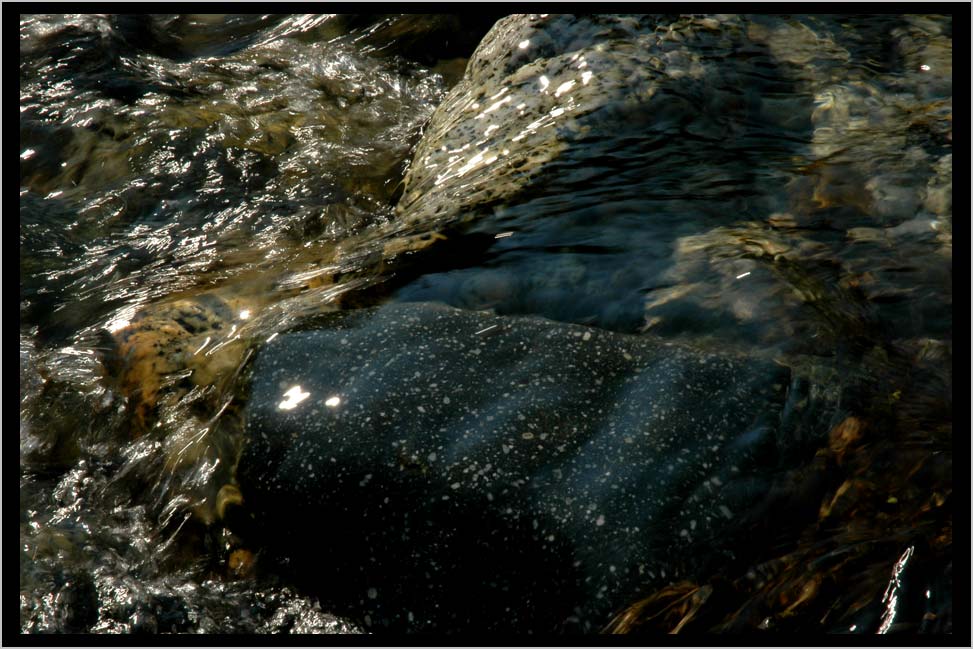
East Eagle Flowforms IV, High Wallowas . . .
On the road in the American Northwest.

East Eagle Flowforms IV, High Wallowas . . .
On the road in the American Northwest.
Below is a new composition inspired by many recent summer camps
around small alpine lakes. It gets me thinking about the nature of
sound, and the resonance of a sound's environment we call echo.
The form is what I call a fractal mirror. The steps or syllables are
very strictly counted—8's, 5's, 3's, 2's and 1's—as in a kind of classical
ballet. But the generation of the patterns can be seen as an
interweaving of chance and necessity, something we very frequently
encounter in nature. Without going into detail here, the left side of
the piece is made with chance processes; whereas the right side
mirrors or echoes this in a deterministic way, resulting in the split
left-right bilateral symmetry of many flowers.
The sound of a voice fading in
a forest pool, among the greens
of ferns and firs, the blonde curls of
girls running
barefoot in all directions a-
way from the centaur.
Some change
into dogwood blossoms, othersinto the
white orchids
of dark, moist,forest floor, the lady's slipper.
So the sound, its ground
tone, vibrates
into the yielding earth, fades away,
like the smoke of alder wood floats
about a mountain hut,
mixes with mist and with the
warmth of the morning sun is gone.
Every call waits for,
hopes for
an answer, just as the whispered
kiss sealed in a letter hopes for
a reply.Love waits longest in the heart with
the deepest roots, roots
that find
their way around hard
rocks and other difficulties.
For in the dark world of feeling,
stones
are but steps on devotion's path.We turn in
the direction of
a sound, but not itsecho. The sound, localized,
individual, folds into the
background of context; Drop a stone
in dry sand and it stops dead; Drop
a stone in a forest pool and
waves ring out from its center, and
expand till they fill the whole. Wet?
Dry? What better comparisoncould be made? Hear the
sound of an oboe
torn apart from its
world, broken
echoes from
nowhere
in the low
scrublands of our age.
The voice of an instrument fights
against the grain of a space, of
a time with little sense of sound.
Clap your hands
and the sound snaps shut above your
ears. The oboist
wets her
reed again, but the space worksnot with, no,
but against
her. The sound'secliptic wants to project out
into the space and
come back in,
like rain falling, rising as mist,
growing dense, and then falling as
rain again once more.
So the cycle turns till she hits
the hard cement walls of the hall.Every note waits for,
hopes for,
an answer, just as the inspired
cadenza builds to a burst of
much applause.Art shines brightest in the mind with
the clearest ears, ears
that cleanse
themselves in stillness,
that know the difference between
the ripping of gears and the high
soft,
pure overtones of the oboe'slowest sounds.
The echo of the
inner ear, how isit possible? That we hold on?—
a phrase, a melody, just long
enough to make a sentence or chord?
It must be tied to the rhythm
of the breath, each in and out of
air clearing the mind for the new:—
The hermit thrush sounds its plaintive
song, framed in the lushdark green of forest
silence. We never
see it sing, yet we
call it real,
echoing
somewhere
in the high
mountains of our mind.
ECHO